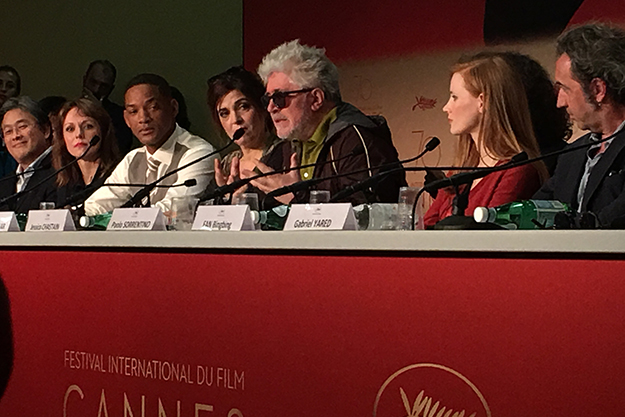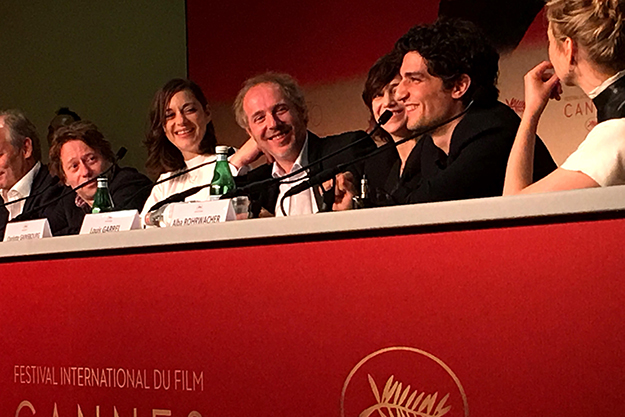Cannes Report #1: Netflix vs. Cannes & Arnaud Desplechin

Pedro Almodóvar and his fellow jurors at a press conference
The perpetual tug-of-war between art and commerce was evident on the opening day of the 70th Cannes Film Festival, which was dominated by talk of streaming platforms and director’s cuts. In the weeks leading up to the event, a debate was ignited when two films owned by digital distributor Netflix (Bong Joon-ho’s Okja and Noah Baumbach’s The Meyerowitz Stories) were programmed in the prestigious competition section, despite the fact that they won’t have wide theatrical distribution.
Since the announcement of the lineup last month, the decision sparked discussions about whether movies should, first and foremost, be seen in cinemas. The festival ultimately issued a statement saying that, in the future, in order to compete in Cannes, films would need to have a theatrical release in France before hitting streaming sites.
“For me, Cannes is a big celebration,” jury president Pedro Almodóvar said today during a press conference alongside his fellow jurors. A Cannes veteran who began coming to the festival in the early 1980s to watch movies, he called the festival, “a celebration of art-house cinema—a genre that I feel most at ease with.”
Asked whether he would prefer to win the Palme d’Or here or have his movie instantaneously distributed around the world—as with a service like Netflix—Almodóvar willingly waded into the debate.
“What I prefer is to be seen in not only 190 countries but always to be seen on a big screen,” Almodóvar said. Moreover, he came prepared with a written statement that he read in Spanish.
His comments stirred speculation about the jury’s plans. Would they penalize the two Netflix titles in competition, many journalists wondered. Some of his words were translated into English inaccurately during the press conference, but one of Almodóvar’s colleagues from his production company, El Deseo, responded to a request from Film Comment. She sent along the original statement for inclusion here:
“Digital platforms are a new way of offering paid content, which in principle can be good and enriching. This new way shouldn’t try to suppress the already existing ones, like going to the movies. It shouldn’t alter the habits of spectators. I think this is the debate. The solution is a simple one: the new platforms should assume and accept the existing rules of the game, which involve accepting the current windows to the various exhibition formats, as well as the investment policies that currently govern in Europe. For me it would be a paradox if the winner of the Palme d’Or in Cannes, or any other award, couldn’t be seen in cinemas.”
Later in the conversation, fellow juror Will Smith countered Almodóvar’s views by defending the digital platform. He said that his own kids go to the movies in a cinema many times per week but also voraciously consume content online. “In my house, Netflix has been nothing but an absolute benefit,” the actor noted. “They get to see films they absolutely wouldn’t have seen. Netflix brings a great connectivity. There are movies that are not on a screen within 8,000 miles of them. They get to find those artists.”
Almodóvar seemed to notice that his words might be misconstrued and asked his translator to read from his statement when offering the English wording, but she declined. So, before the topic was put to bed, he added a few more thoughts:
“This doesn’t mean that I am not open to celebrating new technologies and opportunities, but [as long as] I’m alive I’ll be fighting for the kind of hypnosis of the large screen for the viewer . . . the size of a screen should not be smaller than the chair on which you are sitting. You must feel small and humble in front of the image that is here to capture you.”

Arnaud Desplechin and cast at the press conference for Ismael’s Ghosts
Today, jurors continued to weigh in on the debate even as talk drifted to the opening-night film, Arnaud Desplechin’s Ismael’s Ghosts.
The fifty-something French director and Cannes fixture has confirmed that he’s created two versions of his new movie: a shorter, commercial cut for wider release in France (it opens in theaters domestically this week) and a longer director’s cut that will reportedly mostly screen abroad. The under-two-hour cut can be screened more times daily—making it more profitable—relegating the 20-minute-longer version to Paris’s Cinema du Panthéon art house (a venue owned by the film’s production company, Why Not?). “The original [longer] version is a more intellectual one and the version you’ve just seen is a more sentimental one,” Desplechin explained this morning, without offering much context or directly elaborating on the reasons for the disparity.
Critics here expressed a mild sense of shock that the famously auteur-friendly festival would premiere the shorter version rather than the cut apparently favored by its director and producers. Some even advocated that Desplechin’s director’s cut should be released on Netflix once the film hits digital platforms in France. Perhaps due to these controversies, Desplechin’s film was met with neither applause nor boos, at its first showing, a morning screening primarily for the press. The response as the credits rolled was a rather striking silence.
Ismael’s Ghosts exhibits a striking mix of tones, and its music underscores the film’s many conflicting moods. In press notes, the director called it “five films pressed into one.” The ghost referred to in the film’s title, Marion Cotillard’s Carlotta, has vanished from the lives of those closest to her, including the title character (played by Desplechin stalwart Mathieu Amalric), a tortured filmmaker. She returns after two decades to try to reconnect with both Ismael and her ailing father. A love triangle emerges when she attempts to reignite a relationship with Ismael, who’s found someone new (Charlotte Gainsbourg). Carlotta is “laughing and crying at same time,” Desplechin said today. “She’s looking to regain the love of her husband. She’s like a tiny little devil. The fact that a single woman can have two faces—one for her husband and one for her dad—is so wonderful.”
Some viewers wondered about Desplechin’s connection to those depicted on screen and also speculated about whether it is a linked to his other work. “Lots of directors appear in their films through other people and the other characters come to meet that person,” posited costar Louis Garrel, who said that he began watching the French filmmaker’s movies at the age of 17. “Arnaud is in all of the characters,” Garrel offered. “It’s very biographical.” “I often make a film that is against the preceding film,” Desplechin explained, saying that his latest is meant to contrast his 2015 My Golden Days. “The last is more melancholic, living in the past.” For this one, he said, “I wanted people who really embrace life. I hope it will help you learn how to really love.”
Despite the fact that tens of thousands of press and industry converge on this touristy French coastal town, Desplechin said that he won’t be reading reviews of Ismael’s Ghosts. Fearing that French critics would be the toughest on him, Desplechin said that he asked his producer to survey the media for him.
“It’s alright,” his collaborator told Desplechin, succinctly summarizing the critical response.
“I focused on those two words,” the director added.







